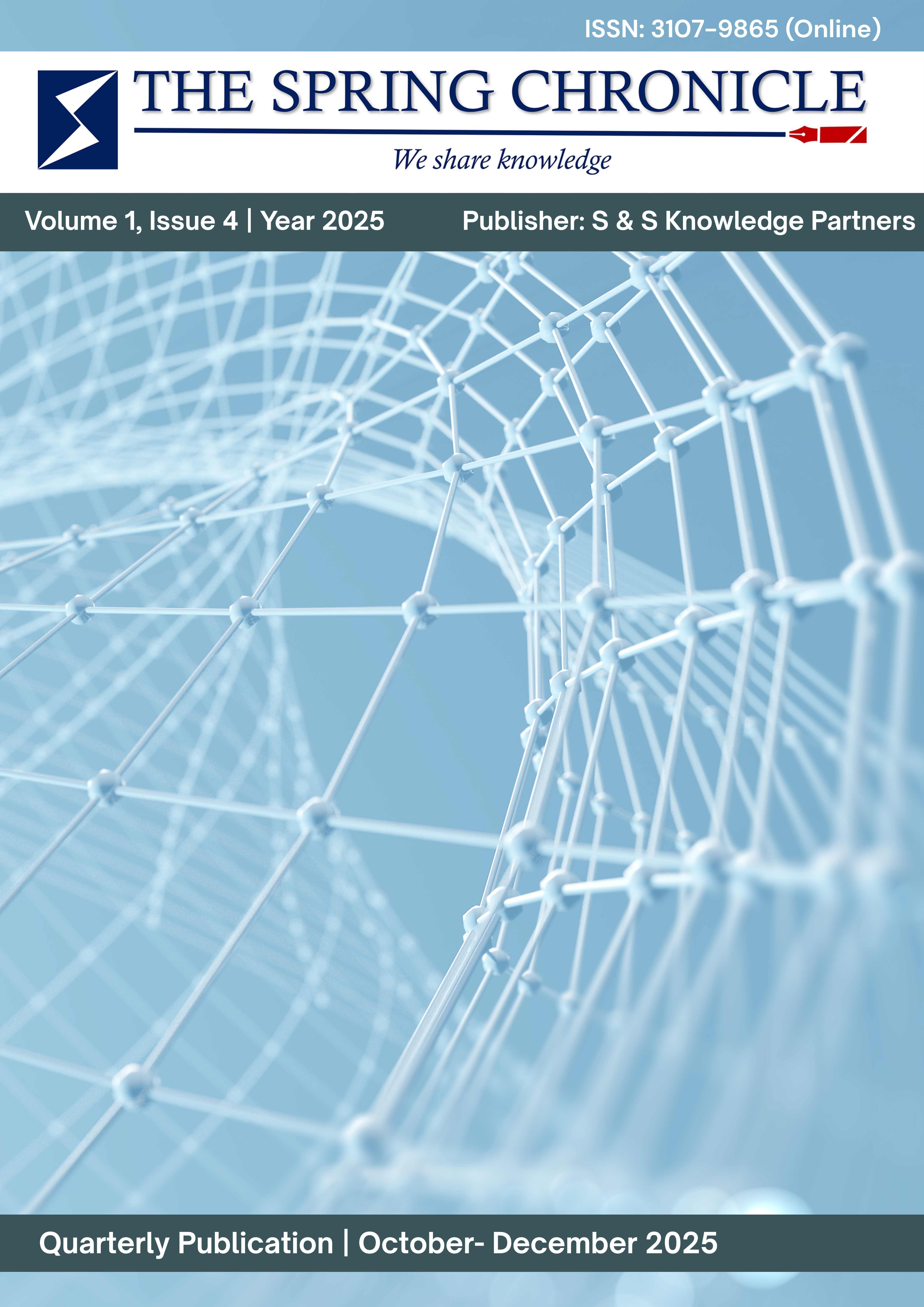Volume 1, Issue 4, October - December, 2025
ISSN: 3107-9865 (Online)
Hello Readers!
Firstly, we wish to share with our contributors and readers that The Spring Chronicle has been granted ISSN-3107-9865 (Online) and as a result, it will be catalogued and indexed by all libraries and publishers. This will benefit both our contributors and readers.
We’re happy to bring the fourth edition with articles on smart/advanced materials, Indian Knowledge Systems and one article dedicated to the role of higher education in Viksit Bharat.
In this review article, Smart Materials: A comprehensive Review of Fundamentals, Types and Applications, Dr. Vivek Jali, Gulbarga University, who has made significant contributions to the field of Materials/Nano Science, describes how these matured fields are transitioning to make materials smart with adaptability properties to different stimuli. He sees enormous range of applications where smart materials would replace conventional ones, impacting science, engineering, medical technology and automotive industries to name a few.
In this article titled, Smart, Sustainable, and Advanced materials for the 21st century, Dr. Ravi Kashikar of IITRAM, Ahmadabad, presents about advanced materials some of which, to a little extent, overlaps with Dr.Jali’s. What makes the study of these advanced materials is their exceptional properties tailored using a set of contemporary computational and ingenious techniques. Their applications scope range from quantum computing to energy storage to advanced electronic devices and so on. Dr.Kashikar combines both computational and experimental techniques for his research.
In this article, Bridging Wisdom and Knowledge: Scientific and Technical Paradigms in Indian and Modern Science, Dr. Arunkumar Khannur, Adjunct Faculty at Presidency University, Bengaluru, has presented the much-needed understanding of the role of Indian Knowledge Systems (IKS) vis-a-vis Modern Science. He maintains that while there is no conflict between the two, the IKS and Modern Science can profitably be “bridged” for addressing some of the most pressing problems of our times, namely, “sustainability, health, and human well-being” among others. Prof. Khannur, a post-graduate in physics and computer science, is a Software Testing Guru of international repute. He is also the author of the best-selling books. His latest book, “Rise and Thrive: You Have No Limits – Only Untapped Potential” has been selected, under non-fiction, Suefios Book of The Year at the 4th Kolkata International Literary Carnival 2026 scheduled for 15th Feb, 2026. The Spring Chronicle team congratulates him with best wishes.
We have carried a special article entitled Privacy and Digital Personal Data Protection Law in India: Some Observations by Dr. Vijaykumar Torgal, a retired KAS officer. The article looks at a sensitive area of privacy of individuals as part of technological sovereignty. This a vexed issue because as Government of India, argues Dr. Torgal, tightens regulatory frame-work, there is more threat to the privacy of the individual on account of the pace of emerging technologies. The solution, he says, lies in achieving technological sovereignty, that is to say, how much of data can be stored within the border of India. The vital question is achieving the right balance.
Dr. B. G. Mulimani and Dr. Jagdish Tonannavar have once again teamed up to discuss the critical role of higher education in Viksit Bharat. In the article titled Positioning Higher Education in Viksit Bharat Part I, they look at the evolution of higher education during British Raj, its consolidation in terms of a number of colleges and universities and lofty goals. In the remaining parts to be covered in later editions. they will discuss the remaining aspects that make up the basic elements and associated factors of higher education.
We profusely thank the above contributors for their kind response. We hope our readers will read articles with interest. The team at The Spring Chronicle wishes all our contributors - the past and present - as well as readers a very Happy New Year 2026.
Dr. Jagdish Tonannavar,
Chief Editor
About the magazine:
The Spring Chronicle is an online magazine for publishing articles on Science, Mathematics, Technology, Engineering, Humanities and Social Sciences for the learned lay-audience. We’re a group of academics committed to sharing knowledge in terms of articles contributed by scientists, scholars and experts. The articles, mostly popular, will cover perspectives (historical/contemporary interest), views and opinions by way of scholarly elucidation and thereby they would enrich people’s understanding.
Title: The Spring Chronicle
Frequency: Quarterly
ISSN: 3107-9865 (Online)
Chief Editor: Dr. Jagdish R Tonannavar
Copyright: The Spring Chronicle, S & S Knowledge Partners
Starting Year: 2025
Subject: Multi Disciplinary Subjects
Language: English
Publication: Online
Editorial Board: https://www.springchronicle.org/About+/Editorial+Board
Editorial Policy: https://www.springchronicle.org/About+/Editorial+Policy
Article Submission Guidelines: https://www.springchronicle.org/About+/Article+Submission+Guidelines
Publisher:
S & S Knowledge Partners, a registered EduTech firm
Nagarbhavi, Bengaluru, Karnataka - 560072, India.
Email: springchronicle@gmail.com






